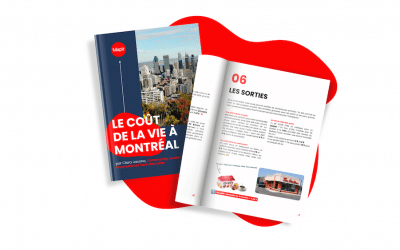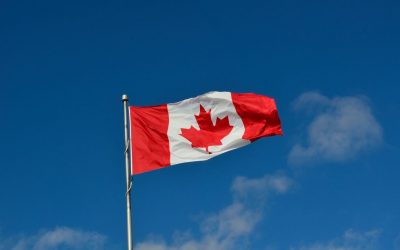Have you worked in Canada as an expatriate? Don't worry, retirement is for you too!s !
Sunbathing in the midday sun with a cocktail (or mocktail)... if that's what retirement means to you, then you'll need to plan accordingly!f this is what retirement means to you, then you'll need to plan accordingly!
As we all know, retirement can seem a long way off for many people. But it's very important to find out how retirement works in Canada as an expatriate, so that you can plan well ahead. Obviously, the sooner you contribute, the more time your money will have to grow. The purpose of this article is to inform you about the various pension plans in Canada and in Quebec as anexpatriate.

Government sources of retirement income in Canada
Canada's pension system operates on three pillars. They provide a safety net for retirees. We will see that in Quebec, this mixed system. It is possible to accumulate benefits from the public plan in addition to private investments for greater financial security.
1️⃣ Canada Pension Plan (CPP)
The Canada Pension Plan is the public pension plan. It covers salaried and self-employed workers in all Canadian provinces. The only exception is Quebec, which has its own plan: the Quebec Pension Plan (QPP). If you work in the province of Quebec and are 18 years of age or older, you will contribute to the QPP by paying compulsory amounts. compulsory contributions until age 65. Your annual salary must exceed $3,500 in order to contribute to the plan. These compulsory contributions are collected and administered by the Caisse de dépôt et placement du Québec and are based on your earned income up to an annual ceiling. You should also know that not only do workers contribute to these plans, but also employers are also required to participate.
2️⃣ The Old Age Security Pension (OASP)
The Old Age Security Pension (OASP) is implemented at federal level. This plan exempts people of retirement age from a basic benefit, regardless of their employment status. Regardless of their financial situation, the PSV guarantees them a minimum amount to meet their needs.
3️⃣ Private retirement savings plans such as RRSPs.
The RRSPRegistered Retirement Savings Plan, is a personal account you can open with your financial institution (bank, credit union, insurance company, etc.). It can also be offered to you by your employer.
The RRSP is because it allows you to save for retirement tax-free. tax-free. In fact, amounts set aside in an RRSP reduce your taxable income. Funds can be invested in a variety of financial instruments.

We know that retirement is a question mark for expatriates in Canada .
That's why at Maplr, employees have have access to an RRSP to help them plan for retirement!
Am I eligible?
CPP or QPP?
To qualify for this taxable monthly benefityou must 👇
- Have worked for at least one year
- Have worked one month or more after your 59ᵉ birthday
- Have made at least one valid CPP or QPP contribution
Being an expatriate in Canada, i.e. residing there temporarily and not having permanent residency or Canadian citizenship, has no impact on CPP or QPP eligibility.
Old Age Security Pension (OASP)?
As mentioned above, the PSV does not take into account the employment income you have earned during your working life. This pension is an amount that people will receive according to certain criteria.
If you meet these criteria, it will be possible to combine CPP or QPP with OAS:
If, at the time of your retirement, you are an expatriate in Canadayou must 👇
- be aged 65 or overs
- be a Canadian Canadian citizen oror legal resident at the time your application is approved
- Aresided in Canada for at least 10 years (since your 18th birthday).
If you live outside Canada when you retire, you must 👇
- be aged 65 or over
- have been Canadian Canadian citizen or legal resident of Canada the day before your departure from Canada
- have resided there for at least 20 years (since your 18th birthday)
How much will I receive when I retire in Canada as an expatriate?
If you worked in Canada during your expatriation and contributed to the CPP or QPP, the amount of your monthly benefits will be based on three factors three factors 👇
- the your average earned income on the job market,
- visit contributions CPP or QPP contributions,
- l'age at which you wish to receive such contributions.

Retirement is generally taken at age 65. At that age, you'll receive 100% of your monthly benefits.
It is possible to receive the pension from the age of 60, but the monthly amount will be reduced.
If, on the other hand, you wish to postpone pension payments until age 70, the amounts will be higher.
Finally, it is possible to receive your pension while continuing to work. your retirement pension.

If you're curious about the amount you'll receive when you retire in Canada Canada or in your country of originyou can use theQuébec government calculation tool to simulate your income!
In addition to the amounts you'll receive from the various governments, it's a good idea to plan for another, parallel source of income. another source of income at the same time. That way, you'll be sure to have a comfortable amount in your old age, and won't have to depend solely on government payments. As mentioned above, the Registered Retirement Savings Plan (RRSP) provides additional financial security.
If you also want to plan your daily budget, don't hesitate to find out about the cost of living in Montreal !
International social security agreements
Have you worked abroad? Don't panic! 🙌
Canada has agreements with various countries so that you can receive the pension of the country to which you have contributed. For the record, there is a bilateral agreement between France and Canada concerning retirement.
👉 Feel free to consult the list of countries that have an agreement with Quebec.
To conclude
Canada's retirement system will enable you to enjoy your life after all those years in the workforce, even if you're an expatriate. By planning now your different sources of income, you can ensure financial security and peace of mind for this pivotal stage in your life. Find out more on the government website and from your financial advisor.
And if you too would like to join the Maplr community 👇



